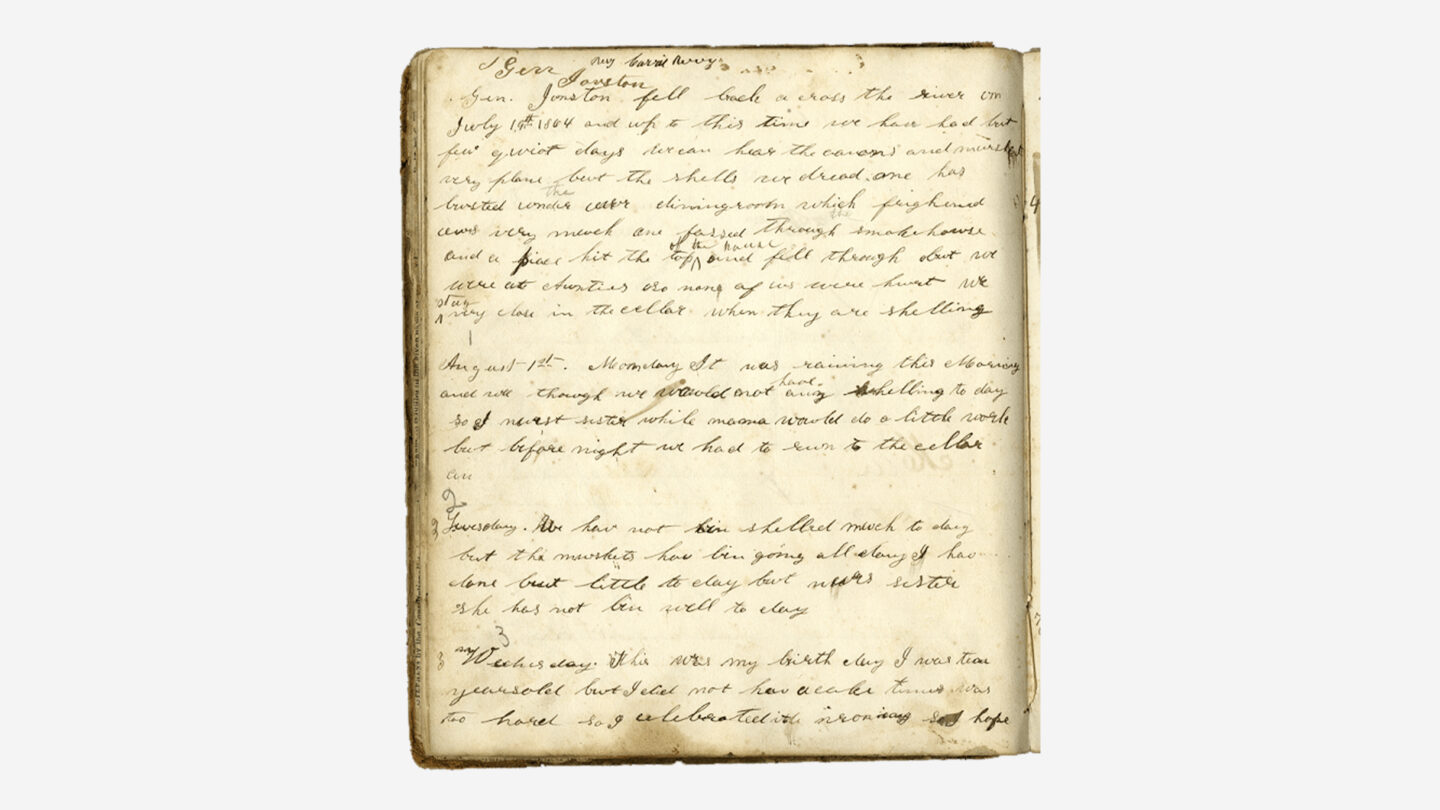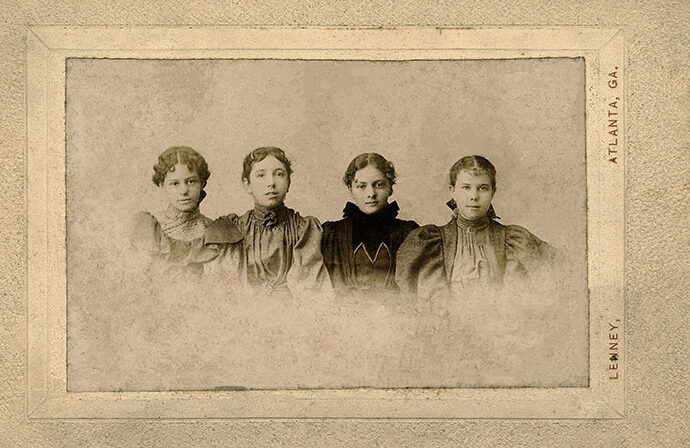
Carrie Berry’s diary, July-August 1864. Berry discusses the shelling of Atlanta by the U.S. Army. Carrie Berry Papers, 1864-1874, 1897, MSS29f, Kenan Research Center at Atlanta History Center
The experiences of soldiers during wartime are frequently chronicled in newspapers, books, television, documentaries, movies, and exhibitions. What is less visible and often harder to uncover are the untold stories of the women and children who remain at home during war, and the loss, pain, and challenges they endure.
Kenan Research Center at Atlanta History Center has a historical document in its collection that provides an interesting perspective on civilian life during war time and what was happening in the city of Atlanta during the Civil War. It’s the diary of a 10-year-old girl named Carrie Mabry Berry. Carrie was the daughter of Maxwell and Harriet Berry and lived on Harris Street with her parents and four siblings, sisters Fannie, Zuie, and Maggie, and brother, Maxwell R. Berry Jr..
She and her family were eyewitnesses to the fire, destruction and deprivations, that accompanied General William T. Sherman’s shelling of the city in August 1864 and the U.S. Army’s evacuation of Atlanta three months later. Carrie describes these events and many others in her diary, which covers the years 1864-1866.
Carrie Berry in her early teens, unidentified photographer, circa 1870. Atlanta History Photograph Collection, VIS 170.739.001
Here are some excerpts from Berry’s diary:
Wednesday, August 3
This was my birthday. I was ten years old, But I did not have a cake times were too hard so I celebrated with ironing. I hope by my next birthday we will have peace in our land so that I can have a nice dinner.
Thursday, August 4
The shells have ben flying all day and we have stayed in the cellar. Mama put me on some stockings this morning and I will try to finish them before school commences.
Tuesday, August 9
We have had to stay in the cellar all day the shells have ben falling so thick around the house. Two have fallen in the garden, but none of us were hurt. Cousin Henry Beatty came in a and wanted us to move, he thought that we were in danger, but we will try it a little longer.
Thursday, August 11
Mama has ben very buisy to day and I have ben trying to help her all I could. We had to go in the cellar often out of the shells. How I wish the federals would quit shelling us so that we could get our and get some fresh air.
Sunday, August 14
Sure enough we had shells in abundance last night. We averaged one every moment during the night. We expected every one would come through and hurt some of us but to our joy nothing on the lot was hurt. They have ben throwing them at us all day to day but they have not ben dangerous. Papa has ben at work all day making the cellar safe. Now we feel like we could stay at home in safety. I dislike to stay in the cellar so close but our soldiers have to stay in ditches.
Monday, August 15
We had no shells this morning when we got up and we thought that we would not have any to day (but, my, when will they stop) but soon after breakfast Zuie and I were standing on the platform between the house and the dining room. It made a very large hole in the garden and threw the dirt all over the yard. I never was so frightened in my life. Zuie was as pale as a corpse and I expect I was too. It did not take us long to fly to the cellar. We stayed out till night though we had them all day but they did not come so near us again.
Tuesday, August 16
We had shells all night. There was a large piece came through Mama’s room directly after we went to bed and fell on the little bed and I expect if we had been sleeping there some of us would have ben hurt. Cousin Henry and Cousin Eddy came to see us to day. They told us that they did not think the Federals would be here much longer to torment us and I hope that it may be so for we are getting very tired of living so.
Friday, August 26
Cousin Henry came in this morning and told us we need not fear the shells any more. The Yankees left there brest works and he hoped they were on the way back to Tennessee. We have had such a delightful day. We all wanted to move to day but we will wait til to morrow and see if the Yankees have gone.
Friday, September 2
We all woke up this morning without sleeping much last night. The Confederates had four engenes and a long train of box cars filled with amunition and set it on fire last night which caused a grate explosion which kept us all awake. It reminded us of the shells – of all the days of excitement we have had it to day. Every one has been trying to get all they could before the Federals come in the morning. They have ben running with saques of meal, salt and tobacco. They did act rediculous breaking open stores and robbing them. About twelve o’clock there were a few federals came in. They were all frightened. We were afraid they were going to treat us badly. It was not long till the Infantry came in. They were orderely and behaved very well. I think I shall like the Yankees very well.
Monday, November 7
Every boddie seems to be in confusion. The black wimen are running around trying to get up north for fear that the Rebels will come in and take them.
Monday, November 14
They came burning Atlanta to day. We all dread it because they say that they will burn the last house before they stop.
Tuesday, November 15
This has ben a dreadful day. Things have ben burning all around us. We dread to night because we do not know what moment that they will set our house on fire. We have had a gard a little while after dinner and we feel a little more protected.
Wednesday, November 16
Oh what a night we had. They came burning the store house and about night it looked like the whole town was on fire. We all set up all night. If we had not set up our house would have ben burnt up for the fire was very near and the soldiers were going around setting houses on fire where they were not watched. They behaved very badly. They all left the town about one o’clock this evening and we were glad when they left for no body know what we have suffered since they came in.
Saturday, November 19
Mama and me have ben ironing all day. We have begun to feel at home but it does not look like Atlanta. The Citizens all met at the City Hall and . There are eighty men in town.

Katie Glover, Rosa Kingsberry, Douglass Gay, and Carrie Berry Crumley’s daughter, Zulette Crumley, William Easter Lenney, photographer, circa 1895. Atlanta History Photograph Collection, VIS 170.3487.001
Following the Civil War, Carrie Berry and her family remained in Atlanta, and she continued to write about her experiences in another diary (also in the Kenan Research Center collection), which covers the years 1868 to 1874. In 1875, Carrie married William Macon Crumley and had three children, Charles Locke, Zulette, and William Gregg Crumley. Her son, William, graduated from the Atlanta College of Physicians and Surgeons and was commissioned as a captain in the Medical Officers’ Reserve Corps in 1917. Stationed in France, he sent letters, telegrams, and postcards to his family throughout World War I, creating a unique personal account of wartime experiences—much as his mother did 50 years earlier .
In 1921, at age 66, Carrie died from gallbladder complications in Fulton County, Georgia. She is buried in Atlanta’s historic Oakland Cemetery.

